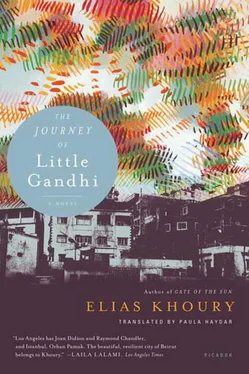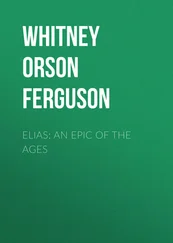If it hadn’t been for al-Askary, Alice would’ve found herself out on the streets. He was the one who told the bar owner that Alice should stay, and so she stayed. It’s true things were topsy-turvy then, but she kept her job. The big upheaval was during the early seventies. Everything changed. Even people’s tastes changed, as if they’d gotten tired of girls with plump bodies. Alice wasn’t fat, she had a full figure, she “filled your eyes,” as she put it. All of a sudden, everything changed. Kamal al-Askary died, and Alice was left all alone.
“That guy Zaylaa was a nobody, just a nouveau riche. The nouveaux riches are all dogs, because no one knows anything about them. I never liked him, nothing ever happened between us. Well, actually, once I was drunk and got crazy, he was crazy, too. He hit me and screamed and broke my bones. He was crazy. Then he started ramming his head against the wall and crying. The whole thing ended with crying, and I was watching. He refused to leave. He was crying so hard I thought he’d die from crying. I’ve never seen a man cry that way. Lieutenant Tannous, when he became like a woman, he got all screwed up and was ready to tear his hair out, but he didn’t cry. Abu Jamil didn’t cry when the owner of the Blow Up kicked him out and spat in his face because he was taking extra commission from the girls and selling them cocaine cut with impurities. But that guy Zaylaa, I don’t what he was. He called himself a man, people like that aren’t men, they’re garbage.”
And Kamal al-Askary died.
That day the Blow Up looked like a different place. Even now, no one knows, was al-Askary killed by Asad Awwad’s bullet, or someone else’s? Alice didn’t know, no one who was there knew. All of a sudden the shooting started. They said the two of them were arguing over a girl. Al-Askary came into the nightclub and saw Awwad sitting with Rita, the Italian girl, and Rita was al-Askary’s girl. Everyone knew Rita was al-Askary’s girl. He came in and saw Awwad sitting with her with his arm around her, having a drink with her. Al-Askary didn’t say anything. He stood up very quietly and then a shot was heard. Alice didn’t know how it happened. Perhaps al-Askary wanted to teach Awwad a lesson, the way he taught the rest. Al-Askary’s lesson was simple; he’d fire one shot at the bottle of whiskey and let the other guy know this was his territory. The other guy would back off and the problem would be solved.
Alice said all the officers in town were afraid of Kamal al-Askary; no one messed with him. Even Awwad knew how to play the game, because he was a professional. That’s why no one could understand what happened, who, what, where, how. They said al-Askary drew his gun and fired at the very moment Awwad turned to fire, and they died together. Alice didn’t believe it. She refused to believe al-Askary could die.
“Not Kamal al-Askary, no way. No one had a faster trigger finger than him.”
Some of those who were there said al-Askary killed Awwad and then one of them shot him and he died. Others said al-Askary drew his gun but didn’t fire, someone in the bar shot and killed both of them. They said it was murder, that the Second Bureau wanted to get rid of both of them. But Alice didn’t believe that. They both fired and both died, that’d be better, she said, trying to tell the story from the beginning.
That day Beirut went up in flames.
Alice said the whole war started in the Blow Up. “If you’d seen it, if you’d been here, it was unbelievable, all of Beirut came out into the streets, the streets actually walked. Al-Askary was being carried over everyone’s head, like he was flying and everyone else was below him. He was above everyone, and when he went down into the grave, the stories started. Women, if you’d seen the women. Women came and started crying. Veiled, unveiled, all sorts of women. He had an entire tribe. That’s a real man. They killed him, that’s what I think. Impossible, al-Askary is the one who shoots, no one shoots him. But he was shot. I saw how he fell, he fell like a mountain, like a heavy door.”
Alice refused to believe it. But they both died. They both fired and they both fell. And Rita took off. Rita, the Italian girl, knew the truth, but she disappeared. She left and took the secret with her. There were rumors she worked for the Second Bureau, and rumors she was an Israeli spy, no one really knew.
That day Beirut lived through two funeral processions. One that crossed Corniche al-Mazraa in West Beirut and ended up at the Cemetery of the Martyrs, and one that walked from Abu Arbeed’s gas station in East Beirut, passed by a gas station belonging to Asad Awwad, and ended up in Saint Mitr Cemetery.
Ever since that day, Beirut has been shrouded in night.
Alice said the civil war started there, and from that day not one day has passed like the previous ones.
“Everything went to pot,” she said. “Women were treated like old shoes, and old shoes got to be more important than men, all the bullies left, and along came Zaylaa, and after him the midget, and after the midget, the Egyptian, none of them are men.”
Alice said when Suad disappeared in 1976, she went to Zaylaa. The Montana was filled with the smell of those lights. Those dim lights placed in the corners would smoke like snuffed-out candles, and gave off a horrible smell. The place was filled with military-style uniforms, men sitting with women who looked like boys, and the fake laughter crackled through the place, while Zaylaa sat at the entrance like a rooster.
Gandhi came in. At first Alice didn’t see him. He was wearing a broad-shouldered black jacket, walking with his head bent forward as if he would fall, and Alice was sitting alone at the bar, a glass of tea with some ice in front of her, a cigarette burning in the ashtray, and her eyes staring blankly, not seeing anything. Alice said she could sit like that for hours without thinking about anything. She’d sit there like a rock, eyes wide open, seeing nothing and hearing nothing. Gandhi looked for her amidst the shoes flying off of the customers’ feet, big shoes in need of lots of shoe polish. He came up to the bar and stretched his hand out to Alice.
“Sit. What’ll you have?” said Alice.
“No, I can’t. I need you. It’s urgent,” Gandhi answered.
“Is everything all right?” she asked.
“The girl,” he said.
“All the girls are at your service. Now you want girls?”
“No, no. My daughter Suad, Suad is missing, she disappeared two days ago, I looked everywhere, maybe they kidnapped her, maybe they killed her.”
Gandhi’s voice was faint and cracking with sadness.
“No problem,” Alice said. “We’ll talk to Zaylaa.”
She took him to the door. Zaylaa was smoking greedily, as if he were chewing the smoke in his mouth before blowing it out of his wide nostrils. He listened to the story of Suad’s disappearance without much concern.
“The crazy girl, aren’t you talking about the crazy girl?”
“Yes. My daughter is sick.”
“Yes, yes, I understand, we’ll see what we can do, you go home, and sleep tight, I’ll take care of it, don’t worry. Hey, we’re neighbors, aren’t we? The Prophet enjoined us to be good to our neighbors.”
“But how?” Gandhi asked.
“What do you mean, How? I told you I’d take care of it, that means I’ll take care of it. You want the girl, don’t you?”
Gandhi nodded his head politely.
“Okay. Go, the rest is up to me, go and sleep and tomorrow, God willing, you’ll have your daughter.”
Gandhi went to his house and slept, and Zaylaa kept sitting where he was. Alice wanted to go with Gandhi, but Zaylaa wouldn’t let her.
“You get inside and take care of business. You think you’re running your own business here?”
Читать дальше












